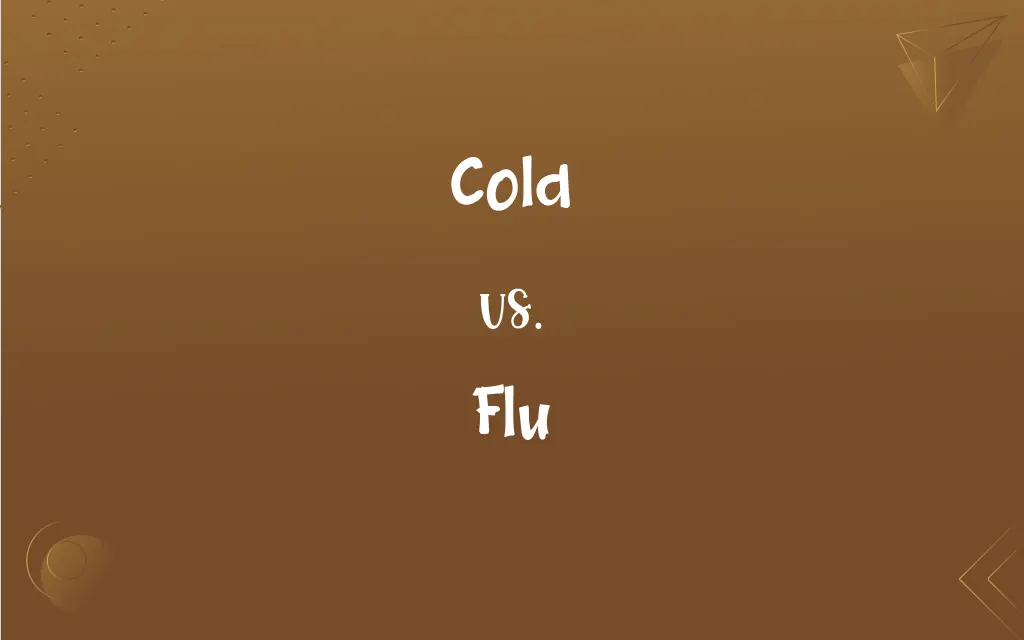Cold vs. Flu: What's the Difference?
Edited by Aimie Carlson || By Harlon Moss || Updated on October 26, 2023
The cold is a mild viral infection affecting the nose and throat, while the flu is a more severe illness caused by the influenza virus.

Key Differences
The common cold, often referred to simply as "cold," is a widespread viral infection predominantly impacting the nose and throat. Symptoms typically include sneezing, coughing, and a runny nose. In contrast, the flu, short for "influenza," is a more serious ailment instigated by the influenza virus. It affects the respiratory system but can also cause muscle aches, fever, and fatigue.
While both the cold and the flu manifest with some overlapping symptoms, the severity and duration of these symptoms usually differ. A cold tends to be milder and can last for about a week. The flu, however, often comes on suddenly and can be severe, with symptoms potentially lingering for weeks. Additionally, the flu can lead to complications such as pneumonia, which can be life-threatening in certain populations.
It's not uncommon for individuals to mistake a cold for the flu, or vice versa, due to the similarity in their symptoms. However, there are some tell-tale signs that differentiate the two. For instance, while both conditions can cause a cough, the flu is more likely to be accompanied by a high fever and intense fatigue. The cold, on the other hand, rarely causes extreme exhaustion and is more focused on the nasal passages.
Another distinguishing aspect between the cold and the flu pertains to treatment and prevention. Over-the-counter medications can often alleviate cold symptoms. In contrast, antiviral drugs might be prescribed for the flu, especially if detected early. Furthermore, while there's no vaccine for the cold, yearly flu vaccines are available and recommended for many individuals.
Comparison Chart
Cause
Various viruses, e.g., rhinoviruses.
Influenza viruses.
ADVERTISEMENT
Severity
Typically milder.
More severe, can lead to complications.
Symptom Onset
Gradual.
Often sudden.
Duration
Around a week.
Can last for several weeks.
Treatment
Over-the-counter medications.
Antiviral drugs and rest.
Cold and Flu Definitions
Cold
A mild respiratory illness caused by viruses.
She caught a cold after getting soaked in the rain.
ADVERTISEMENT
Flu
An illness with symptoms like fever, cough, and muscle aches.
She got the flu shot to avoid getting sick.
Cold
Lacking in affection or warmth.
She gave him a cold stare.
Flu
A disease that can lead to serious complications in vulnerable groups.
Elderly people are more susceptible to complications from the flu.
Cold
A condition of low temperature.
The cold of winter can be harsh.
Flu
An infection that can be prevented through yearly vaccinations.
Many schools organize flu vaccination camps for students.
Cold
An absence of warmth or heat.
He felt the cold metal against his skin.
Flu
Short for "influenza."
The flu season typically peaks in winter.
Cold
Completely or entirely; without preparation or warming up.
He read the passage cold and still understood its meaning.
Flu
A contagious respiratory illness caused by the influenza virus.
He was bedridden for a week due to the flu.
Cold
Having a low temperature
Cold water.
Flu
Influenza.
FAQs
How long does a cold typically last?
A cold usually lasts about a week but can linger longer for some.
Is there a vaccine for the flu?
Yes, yearly flu vaccines are available and recommended for many individuals.
Can the flu affect the digestive system?
While primarily a respiratory illness, the flu can sometimes cause stomach upset or vomiting.
Can I get the flu even after vaccination?
While the flu vaccine reduces the risk, it's still possible to get the flu, but symptoms may be milder.
Are there specific medications for the cold?
There are no antivirals for the cold, but over-the-counter medications can alleviate symptoms.
What viruses cause the common cold?
The cold can be caused by various viruses, with rhinoviruses being the most common.
Can a cold cause a fever?
While rare, a cold can cause a low-grade fever, but high fevers are more indicative of the flu.
How does the flu spread?
The flu spreads through droplets when an infected person coughs, sneezes, or talks.
Should I see a doctor for a cold?
While a cold usually resolves on its own, if symptoms persist or are severe, it's a good idea to see a doctor.
Can the flu result in hospitalization?
Yes, severe cases of the flu can require hospitalization, especially if complications arise.
Is the flu fatal?
In certain vulnerable populations, like the elderly or immunocompromised, the flu can be fatal.
What are common symptoms of the cold?
Sneezing, runny nose, and cough are common cold symptoms.
Can I get the flu from the flu shot?
No, the flu shot cannot give you the flu.
Is the flu more severe than a cold?
Yes, the flu is generally more severe and can lead to complications.
How can I differentiate between cold and flu symptoms?
While there's overlap, the flu often comes with high fever, intense fatigue, and muscle aches, which are less common in colds.
Are there any long-term effects of having a cold?
Colds are typically acute and don't have long-term effects, but recurrent colds could indicate a weakened immune system.
Are children susceptible to the cold?
Yes, children, especially those in school, are prone to catching colds.
How can I prevent getting the flu?
Getting vaccinated, practicing good hygiene, and avoiding close contact with sick individuals can help prevent the flu.
Do colds have complications?
While rare, untreated colds can lead to complications like bronchitis.
Can rest help in recovering from a cold?
Yes, rest can help the body recover faster from a cold.
About Author
Written by
Harlon MossHarlon is a seasoned quality moderator and accomplished content writer for Difference Wiki. An alumnus of the prestigious University of California, he earned his degree in Computer Science. Leveraging his academic background, Harlon brings a meticulous and informed perspective to his work, ensuring content accuracy and excellence.
Edited by
Aimie CarlsonAimie Carlson, holding a master's degree in English literature, is a fervent English language enthusiast. She lends her writing talents to Difference Wiki, a prominent website that specializes in comparisons, offering readers insightful analyses that both captivate and inform.































































